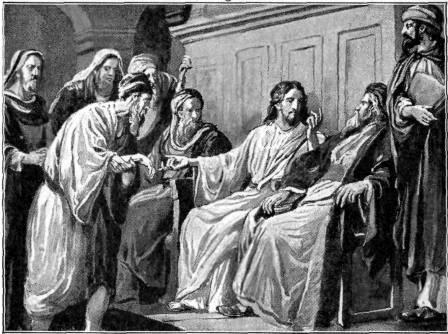
In Luke 6:9, Jesus asks a dumb question.
He asks whether on the Sabbath it is better to save a life, or to destroy it.
The answer is easy. It’s better to save a life. Right?
Well, not so fast.
The question Jesus asks was actually a famous theological question in His day. Today, it might be like asking, “Tell me, is hell real or not?” or “Is the atonement limited or not?” or “Is homosexuality a sin or not?”
The question Jesus asked a hot question in the days of Jesus, and the best and brightest Bible scholars of His day had constructed a neat and tidy three-point answer to that question. The Jewish Rabbis taught the following:
1. On the Sabbath, healing to save a life is not only permitted, but a duty. Though it was the Sabbath, Jews are required to perform work if it will save the life of a person who would otherwise die.
2. Caring for the seriously ill is sometimes allowed on the Sabbath, but only under certain restraints and conditions (which the Rabbis go on to explain).
3. Treating minor ailments is prohibited. This is because a minor ailment is not life threatening, and can therefore wait until after the Sabbath is over. Also, treating minor ailments often required the grinding of herbs to prepare medicine, and grinding is one of the prohibited forms of work.
So that was the official answer to the question which Jesus asks.
But then… why does Jesus ask it?
It is probably not because Jesus was ignorant of the official answer. He was well-trained. He certainly knew the answer.
Well then, is it because He thought His audience did not know the answer? No. Probably not. It was a famous question, and Jewish people everywhere probably knew the answer as well.
So then why did Jesus ask the question?
I’ll tell you why.
Because Jesus hated the answer.
It is not that the answer is wrong. The answer might have been correct.
Jesus asked the question because He was about to do something contrary to the answer, and He wanted to show that even if you have all the right answers to all the hardest theological questions, you can be quite wrong in your actions.
Jesus wanted to show that there was something God cared about more than right answers to tough questions. There is something God loves more than theological accuracy.
What did Jesus care about more than the right answer, and more than the question itself?
The person.
Jesus cared about the person which the question is about.
There is a man standing right there in the synagogue who couldn’t work, couldn’t eat, and couldn’t feed his wife and kids because his hand was ruined. That i’s who Jesus cared about.
When a person is standing in front of Jesus who needs help, He says, “Theology be damned. What can we do to help this person?”
Jesus loved theology and Bible study as much as the next person; but Jesus never loved theology and Bible study more than the next person, for if theology and Bible study does not lead us to love the next person, we have missed the entire point.
This post is based on the Grace Commentary for Luke 6:6-11.




Wow, you actually touched on one of the things I have been wrestling with for awhile. I have been trying to figure out at what point humanity and theology meet. Too much theology and we wound people with our rightness and religiosity and too little theology and we lose sight of the fact that it cost God His Son to redeem our humanity. I guess I have finally come to the conclusion that it is only at the cross where they meet perfectly. Seems so simple, but at the same time difficult as I am one of those people who loves to be right and can easily lose sight of the fact that Jesus had to pay the same price to redeem me in my right (at least in my mind) answers as He did to save “real” sinners. Thanks for the reminder that all roads lead to loving people right where they are and in that way SHOW them who Jesus is.
Thanks Charity.
Hey, how do you and FedEx know each other?
Hey Jeremy!
I am FedEx’sOL! I decided to change to Charity, which is the name the bikers gave me. I felt convicted that outside the bikers, being someone’s ol’ lady can be seen as derogatory.
Charity,
that is what I suspected. Welcome! Say hi to FedEx.
Jeremy,
Excellent point. I agree, although I’m not sure I’d frame it quite the same way.
I’m far from a doctrinal supremacist — these days, very far indeed. But it crosses my mind that if the theology does not reflect the heart of the Theos that it is supposedly about, then the theology is not correct at all, and the opposition you’re discussing is not between “correct theology” and God’s heart. It’s an opposition between bad theology and good.
There is a real difference between theology-in-the-books and theology-in-the-life, but I wouldn’t want to describe that as a conflict — to do so is to set up an opposition between what the Spirit said about God (which is, after all, recorded in a book) and how God actually feels. I’d rather not see us attack the foundations of trinitarian theology….
I’d rather say that theology — knowledge of God — can be described in books, but it is actually found in people. Books can reflect knowledge of God in those that wrote them, and transmit aspects of that knowledge to those that read them, but books are too sterile to contain knowledge. Knowledge is not a substance like ink that can be put on paper; it’s a state of living beings. IOW, books don’t know things; people do. A person who treats a book like it’s the whole thing has made an idol, even if that book is the Bible.
Tim,
I always love the way you put things. It is obvious you have thought a lot about these things.
I agree. Correct theology (or good theology) is lived out among and with people. If it is not, but stays locked in studies and books (and blogs), then it might be unhealthy (or bad) theology.
It occurs to me that I should add that “bad theology” may be a matter of sins by omission, in the way that a brand-new Dodge Viper that happens to have no pistons in it will turn out to be a bad car. Everything that’s there is good, but what’s missing is kinda critical….
Great analogy. Everything that is there is good, but it is missing a few minor (but critical) elements. I like it.